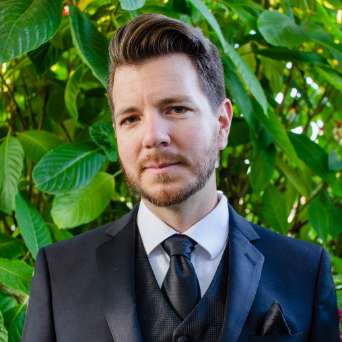There’s nothing quite like your first time. The first time seeing Carmen or Bohème is an unrepeatable experience and no matter how fantastic the performance, it’s hard to replicate the anticipation, the sheer exhilaration of a first time. I’d be lying if I said I hadn’t been similarly excited when Los Angeles Opera announced last year that they’d be staging a brand new production of John Corigliano’s The Ghosts of Versailles.
A revered modern masterpiece, Corigliano’s work has dismayingly stayed sparsely performed since its world première at the Met over 20 years ago. While the reasons are likely to tend toward the practicality of casting and producing this mammoth piece, Saturday’s West Coast première at Los Angeles Opera left no doubt that the opera’s musical and dramatic strengths are considerable. More than that, LA Opera’s production is an inspired effort.
The entire creative team from director Darko Tresnjak to costume designer Linda Cho were faithful to the work’s spirit. From the eerie tones of the opening, the audience is drawn into a world of the dead that is both majestic (as one would expect for royalty) in Alexander Dodge’s sets and, naturally, slightly macabre. The singers heads (stark white, bodies all in black) appear to float, separated from a body double with the inverse. After all, how could a decapitated king challenge an impertinent subject to a duel without his lower extremities in tow?
This world of the dead was a captivating place, yet Tresnjak’s staging was keenly focused on the characters. Marie Antoinette, sung by the indomitable Patricia Racette, and Beaumarchais, by an outstanding Christopher Maltman, were the life of this Versailles. The spirit Corigliano imbues them with through his sympathetic music is expert in its suitability for the stage and Tresnjak facilitated their relationship, and indeed all of the relations, with ease. Of course, it didn’t hurt that his cast was exemplary.
The aforementioned Racette has remained one of the most riveting sopranos working today. As she has sunk her teeth into meatier roles, it has often been to the audience’s benefit. The top of her range has broadened a bit, but she is a fixture on stage, her voice a dramatic force. Racette’s terror while reliving her execution was palpable and her suffering throughout made her final realization and union with Beaumarchais all the more moving. For all of the numbers, all of the characters, Corigliano made this Marie Antoinette’s opera and Racette was up to the task.
English baritone Christopher Maltman was a thoughtful, impassioned Beaumarchais. He sang with distinction and fine diction throughout his lyrical voice. Bass Kristinn Sigmundsson was a comically appropriate, slightly buffoonish Louix XVI.
Beaumarchais’ characters in the opera within the opera, led by Lucas Meachem as Figaro, were similarly outstanding. Figaro’s aria “They wish they could kill me” was a highlight of the performance. Meachem was amiable as the lovable valet and his baritone was imposing, even stentorian. Joshua Guerrero’s was an aloof Almaviva with a beautiful lyric tenor. Tenor Robert Brubaker sang a despicable villain Bégearss. His snarly tenor was something to behold and it’s a wonder that he had any voice left by the end.
Guanqun Yu, in her LA Opera debut as Rosina, was one of the most intriguing voices on stage. To her gracious deportment, Yu added a soaring, easy lyric soprano that was highly expressive of Corigliano’s more tender moments. Broadway legend Patti LuPone performed an amusing turn as the Egyptian singer Samira. Although balance was an issue, LuPone’s mere presence just added to the excess of the evening.
The rest of the considerable cast was quite fine, singing the demanding score with impressive ability while maintaining their dramatic focus. James Conlon led a driving performance from the pit. It was an exceptionally tight, well-measured reading with attentive playing from the orchestra.
In the end, there wasn’t even enough room on stage! At the curtain call the cast stretched the entire width of it with several getting squeezed out of the final bow. Corigliano’s opera really is larger than life, and, appropriately, the last person brought out was the composer himself. The Ghosts of Versailles, over 20 years after its première, (which was 11 years after it was commissioned) was worth the wait. While the opera isn’t perfect, it is a colossal achievement. William M. Hoffman’s poetic libretto with Corigliano’s evocative fusion of styles makes not only an impressive spectacle of theater, but an opera of intense feeling and LA Opera’s production captures that magic exquisitely. It was a triumph.




